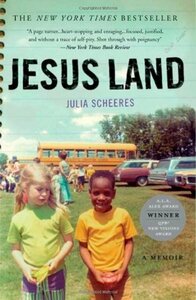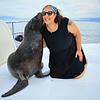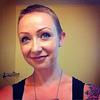Take a photo of a barcode or cover
Surprisingly good. I just thought it would be a basic memoir of fundamentalists and recovery from them. Definitely grim in content, an overall really solid memoir read. Made me think of all the kids forced to go to the popular "survival" type schools when I went to high school in Scottsdale AZ in the early 90s.
challenging
dark
emotional
reflective
sad
tense
medium-paced
A difficult but important read. Really tragic, but an interesting look into race, religion, and family.
This was an engaging read, although it was a bit tough to read at times the abuse that the author and her brother suffered, both at the hands of their parents and at the hands of their teachers as Escuela Caribe (and for the author, at the hands of her other brother Jerome). The lonely home the children grew up in, completely devoid of love and affection and attention, made my heart ache for them. And for her brother David to be brought into the home and never receive the love or affection he desired so deeply was heartbreaking. Reading the book, I was so angry at her parents. For shunning their responsibilities to their children, for investing so heavily in religion instead of in their own family, for bringing two black boys into their home and never accepting or parenting them (among other glaring transgressions). Reading about Escuela Caribe made my blood boil. Sadly, I know these places exist and they do very well. I actually taught at a rehabilitation center/ school many years ago, although it was nowhere near the abusive environment at Caribe (and thankfully not religious), I remember similar conversations with students about privileges and points systems and levels and whatnot. How Scheeres was able to keep her sanity and "play the game" in that place is admirable. The fact that David died at the young age of 20 and never got to create his own life as an adult is just heartbreaking. Oftentimes memoirs can veer into the fantastical- while reading them I start to wonder "Did that really happen?" and I read conversations with a deep skepticism. Somehow Scheere managed to work around that, and the book itself felt real and raw, nothing imagined or pretend or recreated. Excellent writing on Scheeres part.
sad
medium-paced
This is a quick and interesting read. I've been a little suspicious of memoirs lately, but I enjoyed the book.
Well, this book was tragic and devastating. My heart aches for them, especially David. What they had to endure, and much of it in the name of religion, is extremely gross. Very well written.
Fascinating & shocking look at life in a conservative Christian family in the bible belt. I was horrified by the racism, emotional abuse and physical abuse that these kids suffered at the hands of their parents and the Christian reform school they were sent to. I really didn't know that schools like these existed, I guess I'm naive. I always appreciative my own normal upbringing when I read a book like this one.
After reading A Thousand Lives a couple of years ago (also written by Scheeres), Jesus Land was on my radar, but it wasn't until recently that I decided to listen to it. It's definitely one of the more interesting books I've read in a while.
I really felt for Scheeres, who really had some horrible parents. Her dad was largely absent, due to being a doctor, but violent when he is around. And her mother is much more interested in religion than raising children. Their home seemed more like a compound (largely due to the intercoms installed in the house) rather than a home, and her parents seem like the sort of people who would adopt 2 African-American boys to show how Christian they are, rather than because they really want to. As for their biological children? We only see Julia (and not her other siblings) but their idea of parenting is to provide the basic necessities and no affection or caring. They're pretty distant and detached and unfeeling. Still, I do sort of admire them for adopting when it would have been easy not to. And while not really presented in the book, they may have started out with the best of intentions before things went terribly wrong.
The fact that they would get rid of David's things days after he goes to reform school at the age of 16, and some of the comments they made after his early, tragic death at the age of 20 were just horrible. You do have to wonder if their relationships with Julia's older siblings were different, because they seemed pretty indifferent to Julia, David and Jerome. It made me so sad, and so angry on their behalf. I do have trouble believing that rural Indiana in the 70's/80's is as bad as seen in the book, and there is a part of me that wonders if maybe parts of it were embellished. There were so many times when it seemed like the book was set much earlier, and it was always jarring to hear the author reference Duran Duran or Reagan, because it seemed like the book happened several decades earlier than it did.
And the school they had to go to! I can't believe a school like that exists, and yet I'm not surprised that such a school would exist. The things that they had to do- asking permission for everything, including sitting up or down or leaving or entering a room, or using a machete to whack weeds or carrying rocks back and forth for no reason. The reasons why the kids ended up at the school in the first place seemed to be very over-exaggerated and twisted. Julia drinking at a party? It means she's an alcoholic. Julia's brother Jerome ending up in jail? Julia and David will be kept at the school for as long as necessary, even if they're legally adults, just to make sure that they don't end up going down the same path.
Here's where one of my reservations about the book comes in. I mean, Julia does make quite a few mistakes but doesn't seem to show any responsibility for her actions. Granted, the book ends when she leaves Escuela Caribe, plus an epilogue that gives a brief overview of her life and David's after leaving the school. Even in the epilogue, she doesn't reflect on why she ended up in so much trouble. It doesn't make everything else that happened okay, but I do wish we saw even a hint of owning up to her mistakes.
Another thing that I thought was interesting was how one-sided her account seemed. Every adult was horrible and cruel and stupid, and I'm really skeptical of that.
As much as I appreciate her experience, and how horrible some of these reform schools are, and the racism she had to deal with just because of her adopted brothers, and how horrible it is to use religion (particularly Christianity) to abuse kids, there's also something this memoir that didn't quite sit right with me. It wasn't as reflective as I thought, and while I know it's Scheeres memoir, something about it seemed very one-sided to me.
Let's Rate It: Parts of Jesus Land made me so angry and so sad. While parts of it were interesting (especially when she was at Escuela Caribe), overall, something about it seemed off to me. Jesus Land gets 3 stars.
I really felt for Scheeres, who really had some horrible parents. Her dad was largely absent, due to being a doctor, but violent when he is around. And her mother is much more interested in religion than raising children. Their home seemed more like a compound (largely due to the intercoms installed in the house) rather than a home, and her parents seem like the sort of people who would adopt 2 African-American boys to show how Christian they are, rather than because they really want to. As for their biological children? We only see Julia (and not her other siblings) but their idea of parenting is to provide the basic necessities and no affection or caring. They're pretty distant and detached and unfeeling. Still, I do sort of admire them for adopting when it would have been easy not to. And while not really presented in the book, they may have started out with the best of intentions before things went terribly wrong.
The fact that they would get rid of David's things days after he goes to reform school at the age of 16, and some of the comments they made after his early, tragic death at the age of 20 were just horrible. You do have to wonder if their relationships with Julia's older siblings were different, because they seemed pretty indifferent to Julia, David and Jerome. It made me so sad, and so angry on their behalf. I do have trouble believing that rural Indiana in the 70's/80's is as bad as seen in the book, and there is a part of me that wonders if maybe parts of it were embellished. There were so many times when it seemed like the book was set much earlier, and it was always jarring to hear the author reference Duran Duran or Reagan, because it seemed like the book happened several decades earlier than it did.
And the school they had to go to! I can't believe a school like that exists, and yet I'm not surprised that such a school would exist. The things that they had to do- asking permission for everything, including sitting up or down or leaving or entering a room, or using a machete to whack weeds or carrying rocks back and forth for no reason. The reasons why the kids ended up at the school in the first place seemed to be very over-exaggerated and twisted. Julia drinking at a party? It means she's an alcoholic. Julia's brother Jerome ending up in jail? Julia and David will be kept at the school for as long as necessary, even if they're legally adults, just to make sure that they don't end up going down the same path.
Here's where one of my reservations about the book comes in. I mean, Julia does make quite a few mistakes but doesn't seem to show any responsibility for her actions. Granted, the book ends when she leaves Escuela Caribe, plus an epilogue that gives a brief overview of her life and David's after leaving the school. Even in the epilogue, she doesn't reflect on why she ended up in so much trouble. It doesn't make everything else that happened okay, but I do wish we saw even a hint of owning up to her mistakes.
Another thing that I thought was interesting was how one-sided her account seemed. Every adult was horrible and cruel and stupid, and I'm really skeptical of that.
As much as I appreciate her experience, and how horrible some of these reform schools are, and the racism she had to deal with just because of her adopted brothers, and how horrible it is to use religion (particularly Christianity) to abuse kids, there's also something this memoir that didn't quite sit right with me. It wasn't as reflective as I thought, and while I know it's Scheeres memoir, something about it seemed very one-sided to me.
Let's Rate It: Parts of Jesus Land made me so angry and so sad. While parts of it were interesting (especially when she was at Escuela Caribe), overall, something about it seemed off to me. Jesus Land gets 3 stars.
Jesus Land is one of those books where I think the situations portrayed within the book need to be brought to light and known, but I don't find the book itself well-written. Meandering and confusing at times.
I've read several memoirs in the last few months of 2021, most of them about people escaping religious fundamentalism or extremism, and this is by far one of the best I've ever read. Certain scenes have stuck with me even weeks later.






